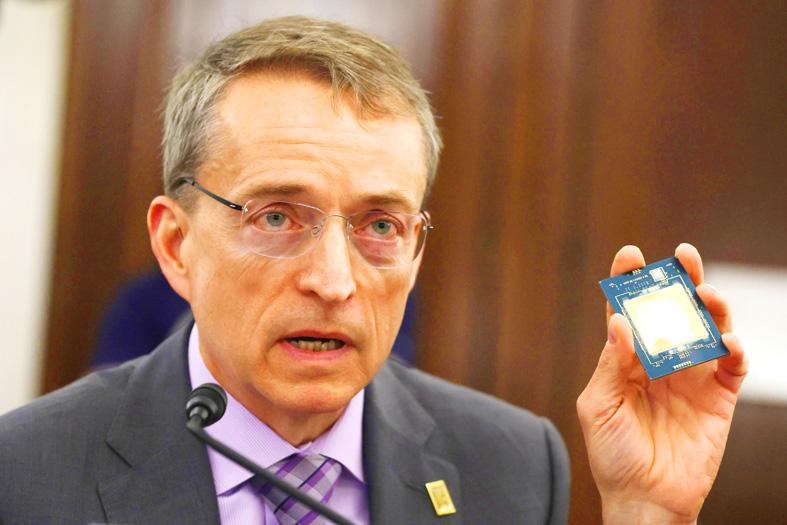Intel Corp chief executive officer Pat Gelsinger is on the move visiting customers and suppliers in Asia in an attempt to shake up an industry that has fallen victim to a global pandemic and geopolitical ructions.
Gelsinger is traveling to Taiwan, Japan and India, a person familiar with his itinerary said.
As part of the trip, he is to meet with Taiwan Semiconductor Manufacturing Co (TSMC, 台積電), the world’s foremost contract chipmaker, which now counts Intel as a client, the person said.

Photo: AFP
The company is not expected to make any significant announcements during the trip.
In addition to TSMC, Intel has other key suppliers in Taiwan and Japan. The company depends on Tokyo Electron for chipmaking equipment, while it relies on Ibiden Co and Unimicron Technology Corp (欣興電子) for Ajinomoto build-up film substrates, materials required for the packaging process.
The leader of the Santa Clara, California-based chipmaker has had a busy first year in charge of the company, tasked with turning back a tide of competition that has weighed on its stock price and earnings.
Gelsinger announced two major chip manufacturing hubs, one in Ohio and another in Germany.
He has called for greater investment from North America and Europe to expand chipmaking capacity in their regions, and make a supply chain largely concentrated in Asia more resilient.
Pointing to the chip crunch that has left industries from automaking to smartphones short of crucial components, Gelsinger has urged governments to “not waste this crisis” as it is a matter of national security, as well as good economics.
“Intel CEO Pat Gelsinger and other members of the Intel team will be increasing local engagements with employees, customers, partners, suppliers and other key stakeholders in various regions around the world,” an Intel representative said. “These engagements are vital as we and others in the industry work together to drive innovation and restore balance and resilience to the global supply chain.”

Taiwan Semiconductor Manufacturing Co (TSMC, 台積電) last week recorded an increase in the number of shareholders to the highest in almost eight months, despite its share price falling 3.38 percent from the previous week, Taiwan Stock Exchange data released on Saturday showed. As of Friday, TSMC had 1.88 million shareholders, the most since the week of April 25 and an increase of 31,870 from the previous week, the data showed. The number of shareholders jumped despite a drop of NT$50 (US$1.59), or 3.38 percent, in TSMC’s share price from a week earlier to NT$1,430, as investors took profits from their earlier gains

In a high-security Shenzhen laboratory, Chinese scientists have built what Washington has spent years trying to prevent: a prototype of a machine capable of producing the cutting-edge semiconductor chips that power artificial intelligence (AI), smartphones and weapons central to Western military dominance, Reuters has learned. Completed early this year and undergoing testing, the prototype fills nearly an entire factory floor. It was built by a team of former engineers from Dutch semiconductor giant ASML who reverse-engineered the company’s extreme ultraviolet lithography (EUV) machines, according to two people with knowledge of the project. EUV machines sit at the heart of a technological Cold

Taiwan’s long-term economic competitiveness will hinge not only on national champions like Taiwan Semiconductor Manufacturing Co. (TSMC, 台積電) but also on the widespread adoption of artificial intelligence (AI) and other emerging technologies, a US-based scholar has said. At a lecture in Taipei on Tuesday, Jeffrey Ding, assistant professor of political science at the George Washington University and author of "Technology and the Rise of Great Powers," argued that historical experience shows that general-purpose technologies (GPTs) — such as electricity, computers and now AI — shape long-term economic advantages through their diffusion across the broader economy. "What really matters is not who pioneers

TAIWAN VALUE CHAIN: Foxtron is to fully own Luxgen following the transaction and it plans to launch a new electric model, the Foxtron Bria, in Taiwan next year Yulon Motor Co (裕隆汽車) yesterday said that its board of directors approved the disposal of its electric vehicle (EV) unit, Luxgen Motor Co (納智捷汽車), to Foxtron Vehicle Technologies Co (鴻華先進) for NT$787.6 million (US$24.98 million). Foxtron, a half-half joint venture between Yulon affiliate Hua-Chuang Automobile Information Technical Center Co (華創車電) and Hon Hai Precision Industry Co (鴻海精密), expects to wrap up the deal in the first quarter of next year. Foxtron would fully own Luxgen following the transaction, including five car distributing companies, outlets and all employees. The deal is subject to the approval of the Fair Trade Commission, Foxtron said. “Foxtron will be